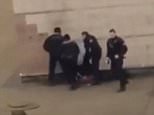Facebook and Snapchat are to launch ‘police’ icons that users can click if they feel threatened online in new crackdown on cyberbullies
- Police officers to monitor social media sites in bid to stamp out cyber bullying
- Social media giants looking into installing police icons to protect their users
- Officer operating remotely can access chats and give advice to bullying victims
Police officers are set to monitor social media sites in a bid to stamp out hate crime and cyber bullying.
Social media companies are looking into installing police icons on their sites which users can click if they feel threatened.
The function would allow an officer working remotely to access the chat and offer advice to anyone feeling vulnerable - or at risk of online grooming by paedophiles.

Police officers are set to monitor social media sites in a bid to stamp out hate crime and cyber bullying (file photo)
According to the NSPCC, the number of Childline counselling sessions for children worried about online sexual abuse rose by 24 per cent in 2015-16 to 3,716.
National Police Chiefs Council Chief Constable Stephen Kavanagh told The Times officers would not be able to roam sites at random and the scheme would work only if the user invited them in.
He told the paper officers would also be able to take details from potential paedophiles trying to groom children online to identify offenders and use as evidence.
The new social media function follows the Snoopers' Charter which was passed by Parliament in November.

. According to the NSPCC, the number of Childline counselling sessions for children worried about online sexual abuse rose by 24 per cent in 2015-16 to 3,716 (file photo)
The new law introduces new surveillance and hacking powers.

National Police Chiefs Council Chief Constable Stephen Kavanagh said officers would not be able to roam sites at random
The bill, officially called the Investigatory Powers Bill, forces electronic data to be stored by internet providers for 12 months, which can be subsequently collected by law enforcement.
Some 48 departments now have access to information such as internet browsing history, set out in Schedule 4 of the Act.
These include police, GCHQ, government departments such as the Home Office, MoD, Department of Health, the Food Standards Agency, HM Revenue & Customs and the Gambling Commission.
NSPCC Chief Executive, Peter Wanless said: 'We need to eliminate all videos of children being physically attacked by other young people, and we are challenging social media companies to play their part by removing this content as soon as it comes to their attention, as well as the public to pledge their support and no longer stay silent.
'Enabling videos of abuse to be shared and circulated may seem like a good way to raise awareness but it can have a very damaging effect, forcing the young person to relive their humiliating and terrifying experience repeatedly.'
Most watched News videos
- Melissa McCarthy nails screeching Sean Spicer on SNL
- Video shows French police 'assault 22-year-old with truncheon'
- Tom Brady reflects on record-breaking fifth Super Bowl win
- Alec Baldwin mocks Trump and his Australia phone call
- Hyundai films Super Bowl commercial DURING Super Bowl
- Police arrest Chanel Lewis for the murder of Karina Vetrano
- Trump awkwardly avoids holding Melania's hand in Florida
- Adorable Xia Vigor sings her heart out to Ariana Grande
- Prisoner knocks out fellow inmate in brutal fight behind bars
- Drones form Stars and Stripes during Lady Gaga half time show
- Gisele Bundchen cheers on her hubby Tom Brady from the stands
- CCTV footage shows what looks to be a ghost in Brazilian prison
-
 It's the Brady bunch! Champion QB poses with entire...
It's the Brady bunch! Champion QB poses with entire... -
 'Now your nightmare begins': Mother of murdered Queens...
'Now your nightmare begins': Mother of murdered Queens... -
 Britney Spears asks for 'prayers' for niece Maddie, 8,...
Britney Spears asks for 'prayers' for niece Maddie, 8,... -
 Lonely man who advertised for a new fishing buddy after...
Lonely man who advertised for a new fishing buddy after... -
 Boy, five, is found dead wearing just his pants and socks...
Boy, five, is found dead wearing just his pants and socks... -
 'Reliable honest' husband who handed his wife, 51, all of...
'Reliable honest' husband who handed his wife, 51, all of... -
 Bercow BANS Trump from addressing Parliament: Commons...
Bercow BANS Trump from addressing Parliament: Commons... -
 'Thugs are randomly shooting at anyone who passes':...
'Thugs are randomly shooting at anyone who passes':... -
 'They've crossed over to mean': Sean Spicer slaps SNL...
'They've crossed over to mean': Sean Spicer slaps SNL... -
 Shocked woman finds a car identical to hers parked...
Shocked woman finds a car identical to hers parked... -
 Policeman is charged with rape after footage emerges...
Policeman is charged with rape after footage emerges... -
 Four inches of snow and 75mph winds are set to blight...
Four inches of snow and 75mph winds are set to blight...





































































































































































































































































































































































